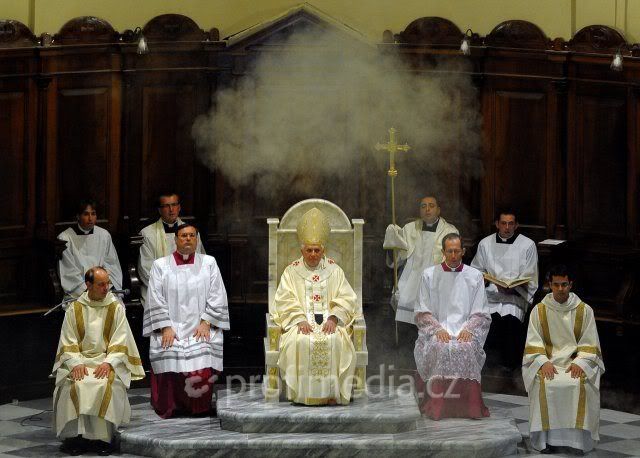
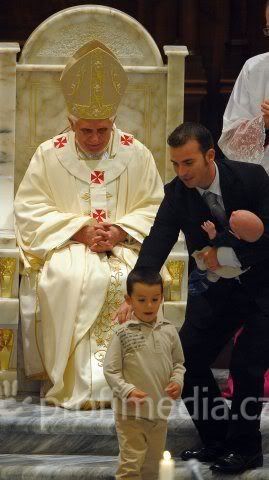 HOMILY ON THE DEDICATION OF THE NEW ALTAR Cathedral of San Pancrazio, Albano Laziale 9/21/08 At 9 a.m. today, the Holy Father went to Albano Laziale to celebrate Holy Mass and dedicate the new main altar of the Cathedral. Welcoming the Pope upon his arrival at the rear gate of the Pontifical Villas of Castel Gandolfo which open on to Piazza Pia in Albano were Cardinal Angelo Sodano, titular bishop of Albano and dean of the college of Cardinals; Mons. Marcello Semeraro, Bishop of Albano; and Albano Mayor Marco Mattei. The Pope walked across the Piazza towards the Cathedral of Albano where he was formally welcomed by the Mayor with brief remarks, and by the Canons of the Cathedral.
HOMILY ON THE DEDICATION OF THE NEW ALTAR Cathedral of San Pancrazio, Albano Laziale 9/21/08 At 9 a.m. today, the Holy Father went to Albano Laziale to celebrate Holy Mass and dedicate the new main altar of the Cathedral. Welcoming the Pope upon his arrival at the rear gate of the Pontifical Villas of Castel Gandolfo which open on to Piazza Pia in Albano were Cardinal Angelo Sodano, titular bishop of Albano and dean of the college of Cardinals; Mons. Marcello Semeraro, Bishop of Albano; and Albano Mayor Marco Mattei. The Pope walked across the Piazza towards the Cathedral of Albano where he was formally welcomed by the Mayor with brief remarks, and by the Canons of the Cathedral.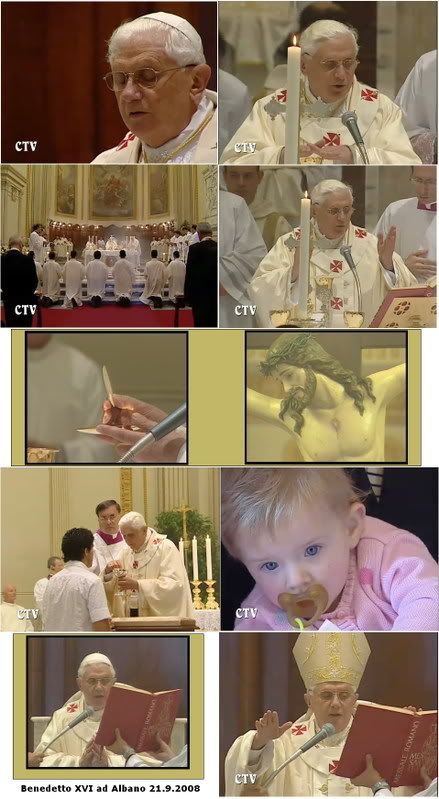
Dear brothers and sisters!
Today's celebration is more than usually rich with symbols, and the Word of God which has just been proclaimed helps us to understand the significance and value of what we are doing today. In the first Reading, we heard the account of the purification of the Temple and the dedication of the new altar of offerings by Judas Maccabaeus in 164 B.C., three years after the Temple was profaned by Antiochus Epiphane (cfr 1 Mac 4,52-59).
To commemorate that event the feast of Dedication, lasting 8 days, was instituted. This feast, initially linked to the Temple where the people came in procession to offer sacrifices, was also enlivened by lighting the homes, and in this form, it survived the destruction of Jerusalem. The sacred author underlines rightly the joy and merriment that characterized that event. But how much greater, dear brothers and sisters, should be our joy, knowing that on the altar, which we are about to consecrate, the sacrifice of Christ himself will be offered daily.
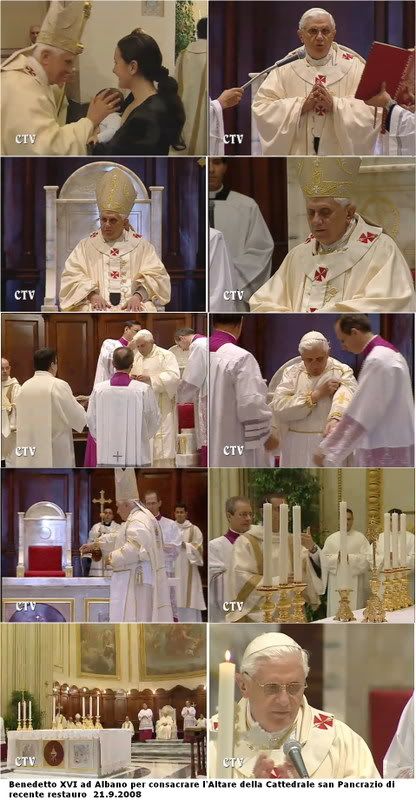 On this altar, he will continue to immolate himself, in the sacrament of the Eucharist, for our salvation and that of the whole world. In the Eucharistic mystery that is renewed on every altar, Jesus becomes really present. It is a dynamic presence, which takes hold of us to make us his, to assimilate us to him. He draws us with the power of his love, making us come out of ourselves to unite with him, becoming one with him.
On this altar, he will continue to immolate himself, in the sacrament of the Eucharist, for our salvation and that of the whole world. In the Eucharistic mystery that is renewed on every altar, Jesus becomes really present. It is a dynamic presence, which takes hold of us to make us his, to assimilate us to him. He draws us with the power of his love, making us come out of ourselves to unite with him, becoming one with him.
The real presence of Christ makes each of us his 'home', and all of us together make up his Church, the spiritual edifice of which St. Peter speaks: "Come to him, a living stone, rejected by human beings but chosen and precious in the sight of God," the apostle wrote, "and, like living stones, let yourselves be built into a spiritual house to be a holy priesthood to offer spiritual sacrifices acceptable to God through Jesus Christ" (1 Pt 2,4-5).
Almost as though developing this beautiful metaphor, St. Augustine observes that in the faith, men are like wood and stone taken from the woods and the mountains for building materials. Through baptism, catechesis and preaching, they are hewn, put together and smoothened to a finish. But they can become the house of the Lord only if they are put together with charity.
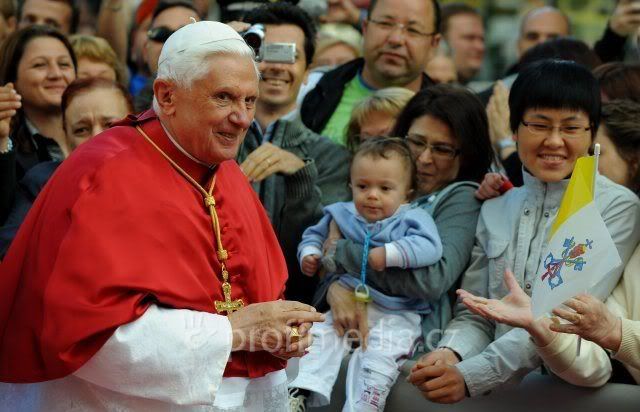 When believers are reciprocally linked according to a determined order, mutually and tightly juxtaposed and cohesive, when they are united together in charity, they they truly become the house of the Lord which does not fear it will collapse (cfr Serm., 336). It is therefore Christ's love, the charity that 'never fails' (1 Cor 13,8), which is the spiritual energy that unites those who take part in the same sacrifice and who eat of the only Bread broken for the salvation of the world.
When believers are reciprocally linked according to a determined order, mutually and tightly juxtaposed and cohesive, when they are united together in charity, they they truly become the house of the Lord which does not fear it will collapse (cfr Serm., 336). It is therefore Christ's love, the charity that 'never fails' (1 Cor 13,8), which is the spiritual energy that unites those who take part in the same sacrifice and who eat of the only Bread broken for the salvation of the world.
Is it, in fact, possible to communicate with the Lord if we don't communicate among ourselves? How can we present ourselves divided at the altar of God, distant from each other? May this altar, on which the sacrifice of the Lord will soon be renewed, be for you, dear brothers and sisters, a constant invitation to love. Come to it always with hearts ready to welcome the love of Christ and to spread it, to receive forgiveness and to give it. To this end, we are offered an important lesson in life by the Gospel passage which was just proclaimed (cfr Mt5,23-24).
It is a brief but urgent and incisive appeal for fraternal reconciliation, indispensable in order to present a worthy offering at the altar - an appeal which takes up a teaching that was already very much present in prophetic preaching.
Even the prophets had, in fact, denounced with vigor the uselessness of acts of worship that were devoid of corresponding moral dispositions, especially in relationships with one's neighbor (cfr Is 1,10-20; Am 5, 21–27; Mic 6, 6-8).
Therefore, every time that you approach the altar for the Eucharistic celebration, may your spirit open up to forgiveness and to brotherly reconciliation, ready to accept the apologies of those who have injured you and ready, in your turn, to forgive them.
In the Roman liturgy, the priest, after having offered the bread and wine, bowing before the altar, prays softly: "Humble and repenting, receive us, Lord: may our Sacrifice which we offer today be pleasing to you." Thus, he prepares to enter, with the entire assembly of the faithful, into the heart of the Eucharistic mystery, the heart of that celestial liturgy referred to in the second Reading, taken from the Apocalypse.
St. John presents an angel who offers "a great quantity of incense... along with the prayers of all the holy ones, on the gold altar that was before the throne" (cfr Ap 8,3). The altar of sacrifice becomes, in a certain sense, the point of encounter between heaven and earth; the center, we might say, of the one Church which is celestial and at the same time, a pilgrim Church on earth, where, between the persecutions of the world and the consolations of God, the disciples of the Lord announce his passion and death, and then his return to glory (cfr Lumen gentium, 8).
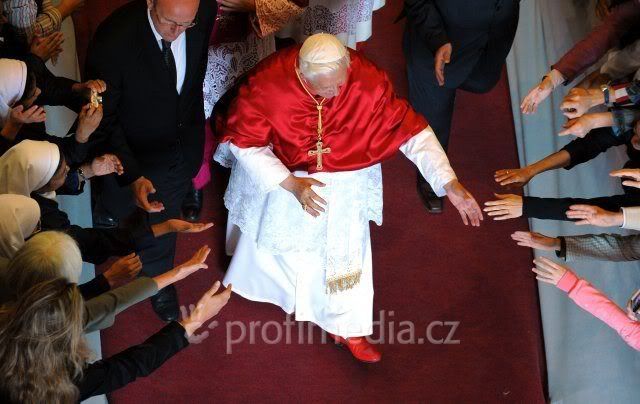 Even more, each Eucharistic celebration already anticipates the triumph of Christ over sin and the world, and shows in the splendor of his Church, "immaculate spouse of the immaculate Lamb, the Spouse Christ loved and for whom he gave himself in order to make it holy" (ibid, 6). These reflections are inspired by the rite which we are about to carry out in your Cathedral, which we admire today in its renewed beauty and which you rightly wish to make ever more welcoming and dignified. It is an effort that has involved all of you, and which, in the first place, asks the entire diocesan community to grow in charity and in apostolic and missionary dedication.
Even more, each Eucharistic celebration already anticipates the triumph of Christ over sin and the world, and shows in the splendor of his Church, "immaculate spouse of the immaculate Lamb, the Spouse Christ loved and for whom he gave himself in order to make it holy" (ibid, 6). These reflections are inspired by the rite which we are about to carry out in your Cathedral, which we admire today in its renewed beauty and which you rightly wish to make ever more welcoming and dignified. It is an effort that has involved all of you, and which, in the first place, asks the entire diocesan community to grow in charity and in apostolic and missionary dedication.
Concretely, this means bearing witness with your life of your faith in Christ and the total trust that you have in him. It also means cultivating the ecclesial communion, which is above all a gift, a grace, fruit of the free and gratuitous love of God, therefore something divine that is effective, always present and functioning in history despite every appearance to the contrary. But ecclesial communion is also a task that is entrusted to the personal responsibility of every one.
May the Lord grant that you live a communion that is ever more convinced and industrious in collaborating and in sharing responsibility at every level: among priests, consecrated persons and laymen; among the different Christian communities of your diocese; among the various lay associations.
I now address my heartfelt greeting to your bishop, Mons. Marcello Semeraro, whom I thank for the invitation and for the kind words of welcome which he gave in behalf of all of you. I also wish to express my fervent wishes on the 10th anniversary of his episcopal consecration. A special thought goes to Cardinal Angelo Sodano, dean of the College of Cardinals and titular bishop of your suburbicarian church, who joins us today on this joyous occasion.
I greet the other prelates present, the priests, consecrated persons, young and old, families, children, the sick - embracing with affection all the faithful of the diocesan community who are spiritually gathered here. I greet the authorities who honor us with their presence, first of all the Mayor of Albano, whom I thank for the kind words he addressed to me before the Mass began.
I invoke on everyone the celestial protection of St. Pancratius, titular saint of this Cathedral, and of the apostle Matthew, whom the liturgy remembers today. I invoke, in particular, the maternal intercession of the Blessed Virgin Mary. On this day which crowns the efforts, sacrifices and commitment on your part to give the Cathedral a renovated liturgical space - with timely improvements on the Episcopal Chair, the ambo and the altar, may Our Lady obtain for you to be able to write another page of daily and popular saintliness,to add to those that have marked the life of the Church of Albano for centuries.
Certainly, as your Pastor reminded, there will be no lack of difficulties, challenges and problems, but equally great are the hopes and the opportunities for announcing and bearing witness to the love of God. May the Spirit of the Risen Lord, which is the Spirit of Pentecost, open you up to his horizons of hope, and nourish in you a missionary impulse towards the vast horizons of the new evangelization. For this let us pray as we proceed with our Eucharistic celebration.















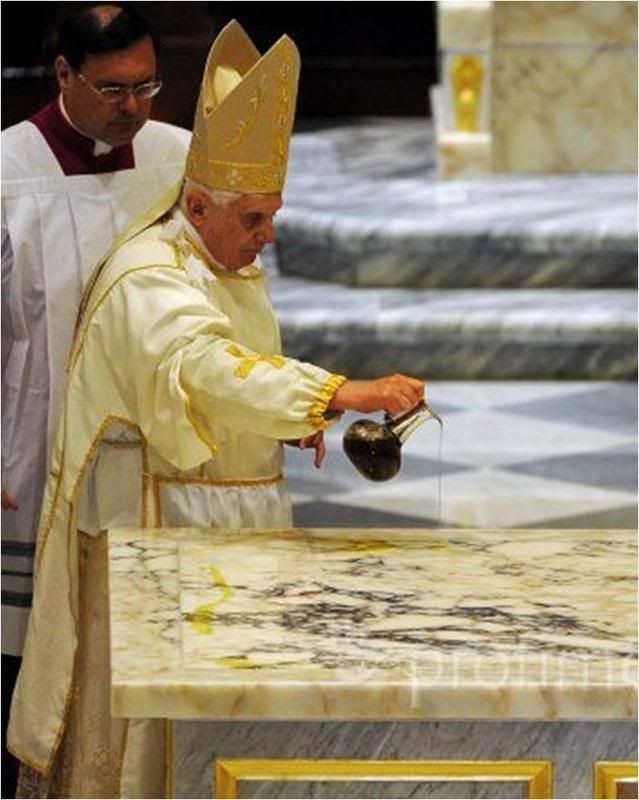
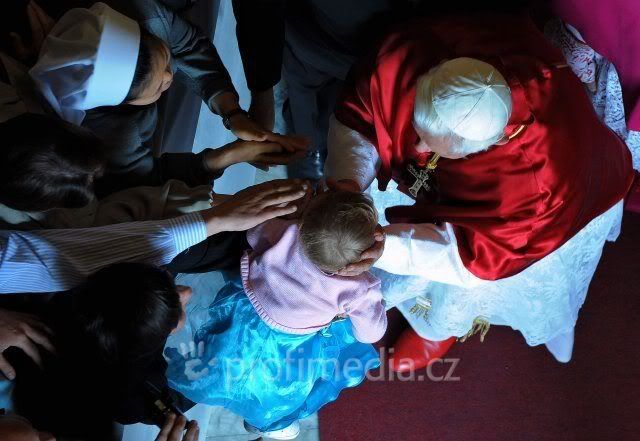
No comments:
Post a Comment